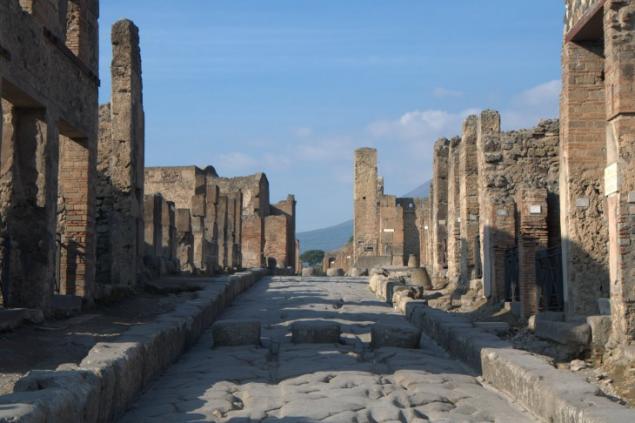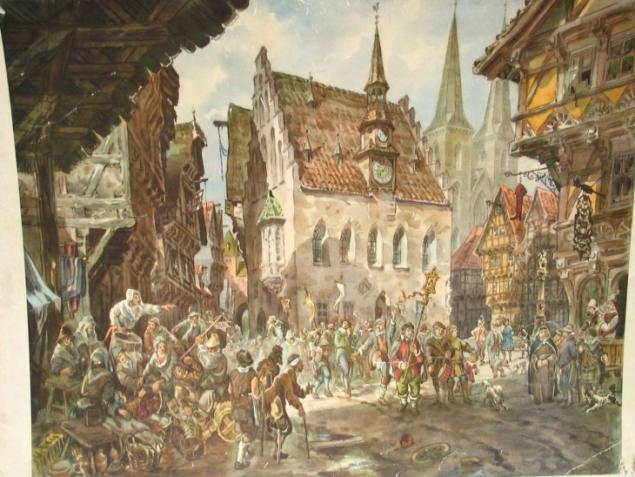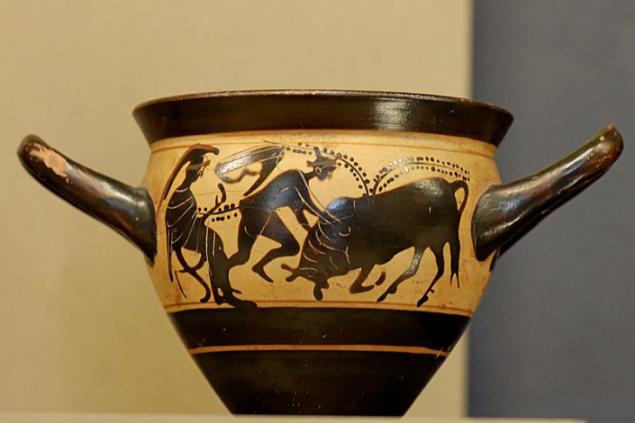732
10 facts that prove that the past was worse than we think
Oh, how we do not want to romanticize the past, representing the then society gallant and romantic, was nothing like this at all. Mankind has long known a hygiene or etiquette. < Website offers you a selection of facts, dedicated to some of the details of the distant past.
Pompeii resembled a giant garbage dump h2> The residents and guests of Pompeii and did not think about the organization of waste collection crews. They did not even try elementary bury garbage. All waste is thrown directly at his feet. The narrow streets, alleys and even the local cemetery were littered with broken pottery, ruins of buildings, half-eaten food and rotting horse carcasses.
The bodies of the Vikings lived millions of parasites h2> Given that they lived close to livestock, it can be concluded that the Vikings were infected with all sorts of parasites in early childhood. And by the time adulthood their bodies were infested with these creatures, which you will not see even in horror movies. Archaeologists studying the diet of the ancient Scandinavians often find eggs, round worm infected or, for example, liver fluke.
A terrible stench of medieval London h2> Medieval London unbearable Raziel. All the streets were literally filled with excrement, rotting food and the remains of dead animals. In some places, this explosive mixture resulted in a terrible smell so that even stay there was impossible.
Europe during the Renaissance was suffering from syphilis h2> In 1495 the French soldiers brought syphilis. This terrible disease in the Renaissance surpassed the scale of modern AIDS pandemic. Disgusting oozing pustules covered the whole body of people, their hair fell out, and the flesh would rot away literally to the bone. There was no public hospitals, so people have picked up the terrible "French disease", painfully dying in the middle of the streets.
The Greek wine was disgusting taste h2> Unfortunately, the Greeks did not know how to store wine for a long time. Therefore, the ancient vintners have used all sorts of tricks to sell soured and fermented product. It was normal to add in wine, for example, resin or marble powder. Someone just left the wine in the courtyard under the scorching sun, where it could turn sour for months. As a result, the consistency of wine gum. It is also known that the ancient Greeks sometimes diluted with its salty sea water.
Personal Care in the XVIII century, one is not particularly concerned with h2> Imagine that you are surrounded by people who are not shy, I'm sorry to spoil the air in public, picking his nose, spit on the floor, even on the premises and go to the toilet by -Large in front of strangers. In England, the XVIII century such behavior was in the order of things.
In ancient Mesopotamia, there were too many pests h2> Pompeii and medieval London - are not the only places where sanitation nobody cares. It deserves a place on this list, and ancient Mesopotamia. The inevitable consequence of the neglect of sanitation were pests, lived with the people in huge quantities.
Jaws dead people replaced their rotten teeth h2> In the early 19th century, the British are very afraid of rotten teeth. And considering that the seals had not yet been invented, and regular brushing people did not burden yourself, awful smile destroys the lives of many people. But suddenly, after the battle of Waterloo in 1815, it turned out that on the battlefield left tens of thousands of corpses of young people, many of them in the mouth were completely healthy teeth.
Toilet paper, reserve thorn in the ass h2> As few as 100 years ago, a visit to the restroom was not very enjoyable. To wipe away the time used old newspapers or magazines. Farmer's Almanac is specially made with a small hole through which it can be convenient to hang in the dressing room, flip through the pages of interesting and uninteresting immediately wipe.
Roman toilets were a living hell h2> In ancient Rome, the expression "public toilet" taken very literally. Try to imagine a group of fifty people sitting in a circle (most often - all shoulder to shoulder) and quietly do their job. Disgusting? But this is only the beginning. Wipe with a sponge had a total no less dirty than the toilet.
Pompeii resembled a giant garbage dump h2> The residents and guests of Pompeii and did not think about the organization of waste collection crews. They did not even try elementary bury garbage. All waste is thrown directly at his feet. The narrow streets, alleys and even the local cemetery were littered with broken pottery, ruins of buildings, half-eaten food and rotting horse carcasses.
Even inside the buildings, everything was about the same. Archaeologists have gathered tens of evidence that the inhabitants of Pompeii did not see differences between their homes and the huge garbage buckets. Rotting food remained on the floor, and the whole mountain of household waste were near sources of drinking water.

The bodies of the Vikings lived millions of parasites h2> Given that they lived close to livestock, it can be concluded that the Vikings were infected with all sorts of parasites in early childhood. And by the time adulthood their bodies were infested with these creatures, which you will not see even in horror movies. Archaeologists studying the diet of the ancient Scandinavians often find eggs, round worm infected or, for example, liver fluke.
In feces, about belonging to the XI century, scientists discovered hlystovika - a parasite that can make life unbearable. In addition to the severe form of diarrhea, flatulence, and painful stools, the Vikings suffered from problems such as delayed cognitive development and growth hormone deficiency.
A terrible stench of medieval London h2> Medieval London unbearable Raziel. All the streets were literally filled with excrement, rotting food and the remains of dead animals. In some places, this explosive mixture resulted in a terrible smell so that even stay there was impossible.
With Thames fared too badly. Butchers decaying meat thrown into the river, and the blood poured out on the beach. In the XIV century, the stench became so unbearable that the king has forbidden to kill animals in the city.

Europe during the Renaissance was suffering from syphilis h2> In 1495 the French soldiers brought syphilis. This terrible disease in the Renaissance surpassed the scale of modern AIDS pandemic. Disgusting oozing pustules covered the whole body of people, their hair fell out, and the flesh would rot away literally to the bone. There was no public hospitals, so people have picked up the terrible "French disease", painfully dying in the middle of the streets.
The Greek wine was disgusting taste h2> Unfortunately, the Greeks did not know how to store wine for a long time. Therefore, the ancient vintners have used all sorts of tricks to sell soured and fermented product. It was normal to add in wine, for example, resin or marble powder. Someone just left the wine in the courtyard under the scorching sun, where it could turn sour for months. As a result, the consistency of wine gum. It is also known that the ancient Greeks sometimes diluted with its salty sea water.

Personal Care in the XVIII century, one is not particularly concerned with h2> Imagine that you are surrounded by people who are not shy, I'm sorry to spoil the air in public, picking his nose, spit on the floor, even on the premises and go to the toilet by -Large in front of strangers. In England, the XVIII century such behavior was in the order of things.
For most people of that era, "personal hygiene" was perhaps that beautiful expression, the meaning of which they do not particularly understand. No one would have looked at your side of the curve, if you came to visit, eat the whole dinner hands, wiped them on his shirt, then belched loudly and finally relish spat on the floor.
Even in the homes of the upper classes, it was not better. Speaking after dinner, the hosts could get pot and facilitate the full view of the guests.
In ancient Mesopotamia, there were too many pests h2> Pompeii and medieval London - are not the only places where sanitation nobody cares. It deserves a place on this list, and ancient Mesopotamia. The inevitable consequence of the neglect of sanitation were pests, lived with the people in huge quantities.
In order to somehow get rid of the mountain of waste, the Mesopotamians allowed wild dogs and pigs rummage through heaps of street litter. Archaeologists claim that the animals hosted anywhere. Even wild pigs could safely roam the royal palace.

Jaws dead people replaced their rotten teeth h2> In the early 19th century, the British are very afraid of rotten teeth. And considering that the seals had not yet been invented, and regular brushing people did not burden yourself, awful smile destroys the lives of many people. But suddenly, after the battle of Waterloo in 1815, it turned out that on the battlefield left tens of thousands of corpses of young people, many of them in the mouth were completely healthy teeth.
This was followed by one of the major breakthroughs in the dental industry. Dentures made from the jaws of corpses suddenly became affordable commodity. For many years, people are willing to wear the jaws of soldiers killed in the Battle of Waterloo. Only when a well-known physician Claudius Ash created the first dentures made of porcelain (it happened in 1835), about this terrible fashion a little forgotten.
Toilet paper, reserve thorn in the ass h2> As few as 100 years ago, a visit to the restroom was not very enjoyable. To wipe away the time used old newspapers or magazines. Farmer's Almanac is specially made with a small hole through which it can be convenient to hang in the dressing room, flip through the pages of interesting and uninteresting immediately wipe.
It will be ugly blame people neglecting toilet paper, since about the middle of the 30s of the last century its use has led to the fact that the fifth point and then stabbed a splinter of wood chips.
Roman toilets were a living hell h2> In ancient Rome, the expression "public toilet" taken very literally. Try to imagine a group of fifty people sitting in a circle (most often - all shoulder to shoulder) and quietly do their job. Disgusting? But this is only the beginning. Wipe with a sponge had a total no less dirty than the toilet.
Free hole went straight into the dark drainage channels, which is inhabited by the most disgusting insects. And because of the accumulation of methane hole at any moment it could explode. Thus, the normal defecation turned into a kind of game of Russian roulette.
via www.publy.ru/post/19304
Favorite dishes from around the world, from which shocked foreigners
10 things we did not know about Sylvester Stallone



























